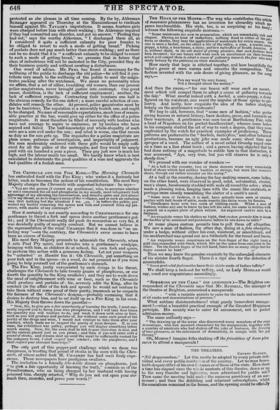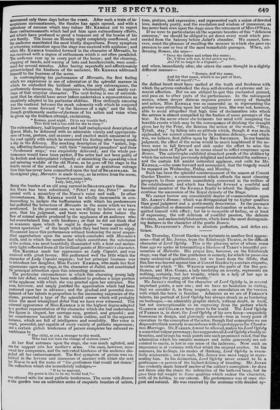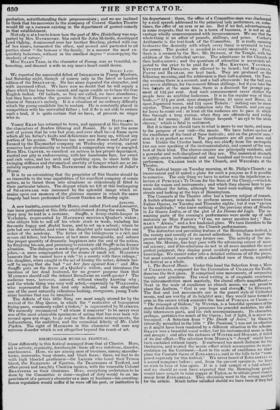THE THEATRES.
COVENT GARDEN.
"Nil desperandum." Let this motto be adopted by every private indi- vidual and every public institution of the country. Let no man hence- forth despair either of his own fortunes or of those of the state. How short a time has elapsed since the whole contents of this theatre, down or up to the very thunder and lightnimr, were advertised for public sale! Then came the meeting held under the ominous presidency of an auc- tioneer ; and then the dribbling and reluctant subscriptions, whilst the executions remained in the house, and the opening could be officii.11y announced only three days before the event. After such a train of in- auspicious circumstances, the theatre has again opened, and with a splendour of success which may induce Mr. KEMBLE not to regret those embarrassments which had put him upon extraordinary efforts, and which have produced so great a treasure out of the bosom of his own family. The house on Monday night completely overflowed, and the audience manifested the most kindly dispositions. Every symptom of returning animation upon the stage was received with applause ; and when Mr. KEMBLE bounded forward in the character of Mercutio, he was received with a degree of enthusiasm which is not often paralleled. The audience rose up in every part of the house; and the cheering, clapping of hands, and waving of hats and handkerchiefs, were conti- nued for several minutes. After having repeatedly and affectionately acknowledged the kindness of the audience, Mr. KEMBLE addressed himself to the business of the scene.
In contemplating his performance of Mercutio, the first feeling which we experience is one of admiration at the splendid' manner in which he embodied the brilliant sallies, the airy extravagance, the gentlemanly demeanour, the ingenious whimsicality, and manly car- riage of that singular character. The next feeling is one of astonish- ment that he should have never before undertaken a representation so singularly adapted to his particular abilities. How strikingly amusing was the contrast between the mock solemnity with which he conjured Romeo to come forward " in the likeness of a sigh," and the droll, though gentlemanly matter-of fastness of his action and voice when he gives up the fruitless attempt, exclaiming,
" Romeo, good night. I'll to my truckle bed;
This field bed is too cold for me to sleep."
The extraordinary, half legendary and half metaphysical description of Queen Mab, he delivered with an admirable variety and appropriate- ness of tone, gesture, and manner; and excited much amusement by the cool agility with which he recovered his footing after having made a slip in the delivery. His mocking. description of the " antick, lisp- ing, affecting fantasticoes," with their " immortal passadoes" and their "Pardon= moys," was exquisitely delivered; and the whole per- formance would have been perfect, if fhe actor had not been guilty of the foolish and interpolated vulgarity of mimicking the squeakingvoiee i and mincing waddle of the old Nurse, as he goes off the stage in the fourth scene of the second act. A more dull or gratuitous outrage than this has never been committed upon the text of SHAKSPEARE. In the original play, Mercutio is made tG say, as he retires from the scene,
" Farewell ancient lady, Lady, lady, lady ! "
Being the burden of an old song current in SHAKSPEARE'S time. For this there has been substituted, " Peter ! my fan, Peter !" accom- panied with a mimickry of the Nurse's voice and walk. In other circumstances, Mr. KEMBLE would be wholly inexcusable in con- descending. to imitate the buffooneries with which his predecessors had polluted the behaviour of Mercutio in the scene which we have mentioned. In the present case, we are willing to believe or to sup- pose, that his judgment, and taste were borne down before the flow of animal spirits produced by the applauses of an audience who • had overwhelmed him with kindness ; or that he did not think that an occasion upon which- he ought to deprive "some quantity of barren spectators" of the laugh which they had been used to enjoy. We cannot leave this performance without bestowing the most unqua- lified approbation upon the scene which concludes with Mereutio's death, and in which the sombre fact which constitutes the substance of the action, was most beautifully illuminated with a faint and melan- choly light reflected from all the brilliant points of Mercutio's character. Mrs. KEMBLE made her appearance as Lady Capulet, and was received with great favour. She performed well the little which the character of Lady Capulet requires ; but her principal business was to introduce her daughter, Miss FANNY KEMBLE, who made her first appearance upon any stage, in the character of Juliet, and constituted the principal attraction upon this interesting occasion. The particular circumstances in which this charming young lady made her debut, would have been sufficient to produce a large portion of the applause with which she was greeted upon her entrance. She soon, however, and amply justified the approbation which had been conferred upon her in advance ; and the gradual and powerful deve- lopment of her talents in proportion to the increasing exigencies of the drama, presented a type of the splendid career which will probably follow the most triumphant debut that we have ever witnessed. The external appearance of Miss KEMBLE is in the highest degree adapted to a perfect representation of the character which she had undertaken. Her figure is elegant, her carriage easy, genteel, and graceful ; and her countenance beautiful in the whole outline, and in the separate features, which are full of intelligence and sensibility. Her voice is sweet, powerful, and capable of every variety of pathetic expression; and a certain girlish tenderness of person completes her outward re- semblance to
" The child, as yet, a stranger to the world, Who had not seen the change of sixteen years."
At her first entrance upon the stage, she was much agitated, and ran for support into her mother's arms. She soon, however, reco- vered her composure, and the reiterated kindness of the audience dis- pelled all her embarrassment. The first symptom of genius was ex- hibited in the fervour and innocence of manner with which she sent her Nurse to ask the name of "the gentleman that would not dance." The reflection which she immediately indulges,— - " If he be married, My grave is like to be my bridal bed,"— • was uttered with the most pathetic tenderness. The scene with Romeo in the garden was an unbroken series of exquisite beauties of action, tone, gesture, and expression; and represented such a union of devoted love, maidenly purity, and the resolution and wisdom of innocence, as has never been seen upon the stage since the retirement of Miss O'NEIL. If we were to particularize all the separate beauties of this " delicious converse," we should be obliged to set down every word which pro- ceeded from the balcony before Juliet's chamber. We cannot, how- ever, resist the pleasure of recalling the manner in which she gave ex- pression to one or two of the most remarkable passages. When, ad- dressing Romeo, she says- " Deny thy father and refuse thy name ; Or, if thou wilt not, be but sworn my love,
And I'll no longer be a Capulet,—" and when, immediately after, she utters the same thought in a slightly different manner-
" Romeo, doff thy name, And for that name, which is no part of thee,
Take all myself!"— the dullest heart must have melted at the truth and freshness with which the actress embodied the deep self-devotion of extreme and in- nocent affection. But we are obliged to quit this enchanted ground, and pass on to other parts of the performance. In the subsequent scenes, where deeper distress requires greater energy of thought and action, Miss KEMBLE was as successful as in representing the gentler woes attending upon her unhappy love. She was not, however, able to avoid altogether that high tone of declamation into which the actress is almost compelled by the fustian of some passages of the text. In the scene where she torments her mind with imagining the horrible events which may be the consequence of drinking the draught given her by the Friar, she finishes the action at the words, " Stay, Tybalt, stay," by falling into an attitude which, though it was much applauded, we cannot commend for its feminine delicacy,—and which was, we believe, first fallen upon by Miss SMITHSON. In our humble judgment, the effect of the scene would be much heightened if the ac- tress were to fall forward and sink under the effort to seize the imagined form of Tybalt as he seems about to inflict vengeance upon Romeo. The catastrophe exhibited abundant proofs of the abilities by which the actress had previously delighted and astonished the audience ; and the curtain fell amidst reiterated applause, and calls for Mr. KEMBLE,—who came forward and announced, that the tragedy would. be repeated on Wednesday, Friday, and Monday. Such has been the splendid commencement of the season at Covent Garden Theatre ; a commencement which affords the most cheering prospects to those persons immediately concerned in the welfare of the establishment, and which has brought forward a youthful and beautiful member of the KEMBLE family to inherit the dignities and continue the succession of the Royal dynasty of the Stage. We cannot bestow any considerable degree of commendation upon Mr. ABBOT'S Romeo; which was diitingnished by no higher qualities than good judgment and a gentlemanly demeanour. In the passages which admitted or demanded energetical declamation or action, he ac- quitted himself with effect; but he is incapable of feeling, or at least of expressing, the soft delirium of youthful passion, the delicate devotion, and melancholy!abstraction, which form the most distinguish- ing features in the character of the gentle Romeo. • IVIrs. DAVENPORT'S Nurse is absolute perfection, and defies cri- ticism.
On Thursday, Covent Garden was fortunate in another first appear- ance—that of Mr. JONES, from the Edinburgh Theatre, in the difficult character of Lord Ogleby. This is the pleasing actor of whom some time ago we spoke as transmitting a likeness of TERRY'S beautiful per- sonation of Malvolio. His proper line, however, on the Edinburgh stage, was that of the fine gentlemen in comedy, for which he possesses many undoubted qualifications ; but we learn from the Globe, that this line was barred against him at Covent Garden by a certain etiquette, in virtue of which " Mr. WRENCH usurps the parts of the fine gen- tlemen, and Mrs. Glass, a lady bordering on seventy, represents (in nothing, certainly, but her vivacity, which in a lady of her age is astonishing) the young girls of twenty.' Mr. JONES'S reading of the character of Lord Ogleby is, in several important points, a new one ; and we have no hesitation in stating, that we consider it, in these respects, an emendation on the version with which the town is familiar. Admirers as we are of FARREN'S talents, his portrait of Lord Ogleby has always struck us as bordering on burlesque,—an admirably graphic sketch, without doubt, in itself, but not unexceptionable as an engraving from the picture which GARRICK and COLEMAN have given to the world. The Lord Ogleby of FARREN is, in short, the Lord Ogleby of his own fancy—exquisitely humorous in design, and glowingly coloured—true in every point of execution to the conception of the actor, though that conception we are disposedto think scarcely in accordance with it sprototype in the Clandes- tineMarriage. Mr. FARREN, it must be allowed, makes his Lord Ogleby a somewhat vulgar personage; he exaggerates all Lord Ogleby's bodily in- firmities, and brings his weak points into such prominent relief, that the admiration which his amiable manners and noble generosity are cal- culated to excite, is lost in our sense of the ludicrous. NOW such an impression is at variance with that which the original excites. In his manners, his feelings, his modes of thinking, Lord Ogleby is essen- tially aristocratic ; and as such, Mr. JONES was most happy in repre- senting him. In his delineation, Lord Ogleby never ceased to be .a gentleman—a person of the highest delicacy of breeding. Mr. JONES has evidently made himself master of the author's conception : he does not throw into the shade the infirmities of the battered beau, but he gave their full weight to those qualities which endear the character, with all its foibles, to our esteem. His performance was at. once elegy gent and natural. He was received by the audience with decided ap- probation, notwithstanding their prepossessions ; and we are inclined to think that his accession to the company of Covent Garden Theatre would fill up a vacuum existing in the department of genteel comedy in that establishment.
Nobody is at a loss to know how the part of Mrs. Heidelberg was sup- ported by Mrs. DAVENPORT. She rated Sir John Melwille, worshipped Lord Ogleby, domineered over her brother Sterling, plotted with one of her nieces,. tormented the other, and wowed and purtested to all parties about " the honour o' the family," in a manner the most ex- quisitely ludicrous, without in the smallest degree " overstepping the modesty of nature." Miss ELLEN TREE, in the character of Funny, was as beautiful, in- teresting, and discreet a wife as any man's heart could desire.
DRURY LANE.
We reported the successful debut of INCLED014 in Young Meadows, last Saturday night, though of course only in the latest or London edition of the SPECTATOR. He has since repeated the character, and with increased effect. We have now no doubt that he will supply a place which has long been vacant, and again enable us to hear the true English ballad. Of ballads, as they are called, we have abundance; but they have neither the genuine feeling of DIBDINS muse nor the charm of SHIELD'S melody. It is a situation of no ordinary difficulty which the young candidate has to sustain. He is constantly placed in competition with his unrivalled father ; but if he is not able to endure such a trial, it is quite certain that we have, at present, no singer who is.
HAYMARKET.
Young KEAN has returned to town, and appeared at this theatre in the characters of Reuben Glenroy and Romeo. He is yet the same sort of person that he was last year, and ever shall be—a frame upon which all his father's faults and deficiencies are hung up, without any portion of his genius. Whoever has not seen Romeo and Juliet per- formed by the Haymarket company on Wednesday evening, cannot conceive how abominably so beautiful a composition may be mangled. Even Mrs. GLOVER, so excellent an actress in her proper department, excited our pity in endeavouring, with her handsome face, her sweet and rich voice, and her arch and sparkling eyes, to show forth the twinging stiffness and rheumatical acerbity of temper which are so ini- mitably represented by Mrs. DAVENPORT in the character of Juliet's Nurse.
It is to us astonishing that the proprietor of this theatre should be so insensible to the true capabilities of his excellent company of comic actors, as to thrust them into situations so ridiculously ill fitted to their particular talents. The disgust which we felt at this burlesquing of SHAKSPE ARE was increased by the splendid image which re- mains upon our memory of the glorious manner in which the same tragedy had been performed:at Covent Garden on Monday night.
AnELPHI.
A new burletta, concocted by Hoop, and called York and Lancaster, has been performed at this little establishment during the week. The story may be told in a sentence. Snaffle, a livery-stable-keeper in Yorkshire, (represented by Delarnaws) marries a Quaker's widow; who obliges him to sell off his whole stock in trade, including his favourite buggy and )(leant horse, and to set up a school ; where he gets but one scholar, and where his daughter gets married to the one usher of the academy. The father of the bridegroom is a rich and severe old fellow, but becomes at last more manageable, and infuses the proper quantity of dramatic happiness into the end of the action, by forgiving his son, and promising to reinstate old Snuffle in his former situation. The dialogue is made up of puns, quibbles, jingles, and little jokes,—a mere congregation of the atoms of small wit. MATHEWS laments that he cannot have a ride "in a county with three ridings ;" his daughter, when caught in the act of kissing the usher, defends her- self by saying that she had " set her face against him;" and Mrs. Snaffle puts on the dress of a Quaker's widow, and introduces the mention of her dead husband, for no graver purpose than that MATHEWS should call the defunct Broadbnm an earth-quaker! The audience were, however, amused, without exactly knowing why ; and the whole thing was very well acted,—especially by WILKINSON, who represented the first and only scholar, and was altogether one of the most naturally ridiculous-looking, overgrown, young York- shire boobies that can be imagined.
The defects of this little thing are most amply atoned for by the revival of the May Queen, in which the " renhvater of transparent frying-pans, commonly called a tinker," is represented by MarnEws. We earnestly recommend " all whom it concerns" to be merry over one of the most admirable specimens of acting that has ever been wit- nessed upon any stage, to go and see the domestic arrangements, the indiscretions, the ambition, and the connubial felicity of Mr. Caleb Pipkin. The sight of MATHEWS in this character will cure any nervous disorder which is not altogether beyond the reach of art.




















 Previous page
Previous page